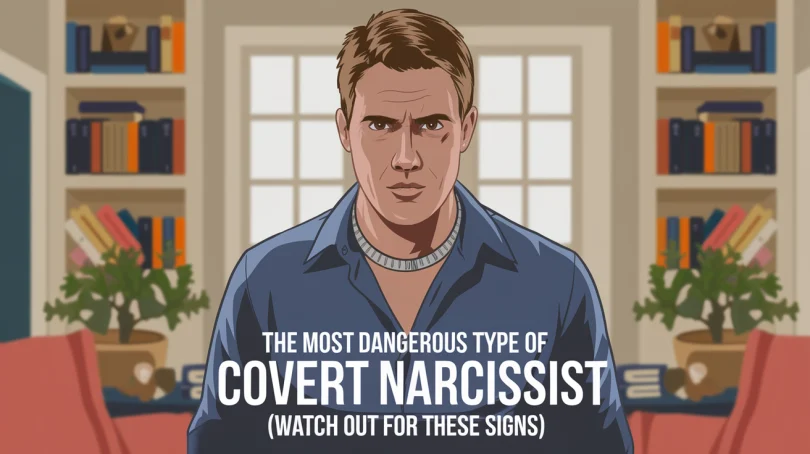They’re masters of manipulation. While other narcissists show their true colors quickly, this type hides in plain sight. They’ll make you question your sanity, turn your family against you, and destroy your life, all while convincing everyone that they’re the victim. In today’s article, I’m exposing the most dangerous type of covert narcissist that even therapists sometimes miss.
The Victim Controller’s Mask
First, let’s talk about what makes this type of covert narcissist so dangerous. Unlike grandiose narcissists who love the spotlight or typical covert narcissists who just withdraw and sulk, the victim controller is playing chess while others are playing checkers. What makes them lethal? They don’t just manipulate you; they create an entire alternate reality where they’re the innocent victim and you’re the monster. Here’s how they do it.
First, they present themselves as deeply vulnerable. You’ll hear stories about their past trauma, their abusive ex, or how everyone has betrayed them. And here’s the twist: these stories might even be true, but they use this vulnerability like a weapon.
When you first meet them, they’ll say things like, “I’ve never felt safe enough to share this with anyone before,” “You’re the only one who truly understands me,” or “I can finally be myself around you.” But this perceived vulnerability serves three deadly purposes: it makes you let your guard down completely, it gives them the perfect excuse for their future controlling behavior, and most dangerously, it establishes their role as a victim early on.
Related Topics:
Unveiling the Enigma: Understanding Covert Narcissists
THIS is the most DANGEROUS type of narcissist
The Narcissist Is Fighting For Your Mind
10 Ways To Identify A Narcissist
How To Start Distancing Yourself From A Narcissist
Here’s where it gets more sinister. While they’re sharing their vulnerability with you, they’re also carefully building what I call their “sympathy army.” They’re telling their sob stories to your friends, your family members, your co-workers, and even your therapist. And they do this so gradually, so skillfully, that by the time you realize what’s happening, they’ve already created a support network that believes their version of reality.
But here’s what most people miss: the early red flags. Watch out for these subtle signs:
- They tell detailed stories of past abuse, but somehow, they’re never at fault in any situation.
- They use phrases like, “I’m just too trusting,” or “I always attract toxic people.”
- They share deeply personal information very early in the relationship.
- They seem to have a rotating cast of friends who’ve all betrayed them.
- Most importantly, they start subtly suggesting that your normal reactions are signs of abuse.
Here’s the most dangerous part: every time you try to defend yourself or point out their behavior, they’ve already laid the groundwork to make you look exactly like the type of abuser they warned everyone about. Remember this: the better you look to others, the more satisfying it is for them to eventually paint you as the abuser.
They specifically target people with good reputations, strong support systems, and caring personalities. Why? Because bringing down someone “good” proves their victim narrative even more powerfully. In the next section, I’ll show you exactly how they use these foundations to launch their most devastating attacks.
Their Tactical Arsenal
Now that you understand their mask, let’s expose their most dangerous weapons, the tactics that make them truly devastating. I call this their “invisible arsenal” because these weapons leave no obvious marks, but the damage is profound. Let me break this down.
First: Concern Gaslighting
Unlike obvious gaslighting, they use what I call “concern gaslighting.” It sounds like this:
- “I’m worried about your memory lately.”
- “I say this with love, but have you considered talking to someone about your anger?”
- “I’m just concerned because this isn’t like you.”
But here’s the terrifying part: they don’t just say these things they start documenting your “concerning behavior” in their phones. Why? Because they’re building evidence while appearing caring. Brilliant but terrifying.
Next: Emotional Blackmail Disguised as Vulnerability
Watch for phrases like:
- “I can’t handle conflict because of my past trauma.”
- “When you raise your voice, it triggers my anxiety.”
- “I might need to take a break from us because this is affecting my mental health.”
See what they’re doing? They’re controlling your behavior while making you feel guilty for causing them pain.
But Here’s Where It Gets Even More Dangerous: The Triangulation Strategy
Unlike other narcissists who just badmouth you, these masters of manipulation create elaborate webs of support. They’ll:
- Have anxiety attacks in front of your friends.
- Make tearful phone calls to your family members.
- Seek advice from your mutual friends about your “concerning behavior.”
And here’s their genius move: they provoke you privately while documenting everything. They’ll send long, caring messages after causing a private fight, record your emotional reactions without showing their provocation, take pictures of themselves after making you break down, and save every text where you react to their abuse.
Their Most Effective Weapon: Their Special Brand of Gaslighting
It’s different because it comes wrapped in apparent kindness and concern. They’ll say things like:
- “I’m telling you this because I care about you.”
- “Everyone’s worried about your behavior lately.”
- “Maybe we should both get help, even though I’m just trying to support you.”
But here’s the devastating part: they provoke you until you react, then use your reaction as proof of their claims. They push your buttons privately, then document your response publicly. And because they’ve already convinced everyone that they’re the vulnerable ones, your legitimate reactions look like abuse.
Let me give you a real example: They’ll subtly insult you for hours in private, then when you finally raise your voice, they’ll start recording and say tearfully, “See, this is what I deal with. I’m so scared right now.” And because they’ve already told everyone about their past trauma and your “concerning behavior,” guess who everyone believes? In the next section, I’ll show you how they use all these tactics to launch their final destructive phase.
The Destruction Phase
Now we’re entering the darkest part: their endgame. This is where all their previous tactics come together in a devastating campaign to destroy your life while maintaining their innocent image. Let me show you exactly how they execute this final phase.
First: The Isolation Campaign
But here’s what makes it brilliant and terrifying: you won’t even realize it’s happening. They use what I call the “concerned circles technique.” They’ll:
- Tell your friends, “I’m worried about them; they’ve been so angry lately.”
- Confide in your family: “I don’t know what to do anymore; he’s not the person I fell in love with.”
- Even contact your therapist, “I’m here because I’m concerned about their mental state.”
And remember all those “concerned” documents they’ve been collecting? Now, they start using them strategically. They’ll show their therapist recordings of your reactions (but not their provocations), share your frustrated text messages in group chats (but not their manipulative ones that caused them), and post subtle hints on social media about “praying for strength” or “dealing with difficult times.”
And Here’s Their Master Stroke
They make you look like the narcissist. They do this by provoking you privately until you snap, recording your response, and showing others while crying, “See, this is what I deal with behind closed doors.” And why do traditional support systems fail to spot this abuse? Because this type of narcissist has already:
- Built a reputation as the vulnerable one.
- Create a documented history of your “abuse.”
- Gathered a support network that validates their version of reality.
- Positioned themselves as the one seeking help and advice.
The perfect trap.
Here’s What Makes This Phase Truly Destructive
They maintain their public image perfectly while systematically destroying yours. They’ll:
- Continue being the perfect partner in public.
- Show extreme concern for your mental health.
- Offer to help you get treatment for your “issues.”
- Express sadness about your “decline” to mutual friends.
And here’s the cruel irony: the more you try to defend yourself, the more you prove their point. They’ve created a perfect trap where your anger confirms their claims about your abuse, your attempts to expose them look like manipulation, your evidence appears as attempts to control them, and your truth sounds like lies.
By the time you realize what’s happening, they’ve already turned your support system against you, created a documented history of your “abuse,” positioned themselves as the concerned, loving partner, and made any attempt to expose them look like further abuse. In the next section, I’ll give you the exact strategies you need to protect yourself before they can execute this destruction phase.
Protection Strategies
Now, let me give you the exact strategies you need to protect yourself. This is crucial information, so grab a pen because these techniques could save your sanity and reputation.
First: Documentation
But not just any documentation will do; you need what I call the “triple-layer protection system.”
- Layer One: Daily Digital Defense
- Keep a timestamped journal in your email by emailing yourself daily incidents.
- Save screenshots with visible dates and times.
- Record conversations where legal (check your local laws).
- Back everything up to a secure cloud account they can’t access.
- Layer Two: Physical Evidence Collection
- Keep a handwritten journal with dates and exact quotes.
- Save any physical letters or cards showing their contradictory behavior.
- Maintain a record of witnesses to specific incidents.
- Document any financial transactions or changes in shared accounts.
- Layer Three: Professional Documentation
- Start seeing a therapist who specializes in narcissistic abuse.
- Get regular medical checkups to document stress-related symptoms.
- Keep records of any work performance issues caused by the stress.
- Maintain correspondence with legal professionals if necessary.
Now Here Are the Key Phrases That Will Help You Stay Grounded in Reality
I call these “reality anchors.”
- When they say, “You’re too sensitive,” respond internally with, “My feelings are valid.”
- When they claim, “That never happened,” remind yourself, “I trust my memory.”
- When they push, “You’re the abusive one,” remember, “Defending myself isn’t abuse.”
- When they insist, “Everyone agrees with me,” think, “Others’ opinions don’t define my reality.”
But Here’s the Most Critical Part: Building a Support System
You need to find at least one person who can be your “reality witness.”
- Connect with support groups specifically for covert narcissistic abuse.
- Build relationships with professionals who understand this type of manipulation.
- Create a safety network separate from your shared social circles.
Now About Digital Evidence
This is crucial. You need to save everything, but store it securely.
- Create multiple backups of text messages, emails, and social media interactions.
- Document patterns, not just incidents.
- Keep a chronological timeline of events with supporting evidence.
And Finally, Before You Even Think About Confronting Them, Take These Critical Steps
- Secure all your important documents.
- Create a separate bank account they don’t know about.
- Build your evidence file with multiple copies in different locations.
- Have a safety plan ready, including a place to stay.
- Consult with a legal professional who understands narcissistic abuse.
Remember this: the time to start protecting yourself is the moment you first suspect something’s wrong. Don’t wait for proof by then, it might be too late.






